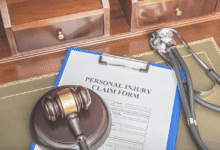How to File a Car Accident Claim in Florida: Personal Injury Steps
Florida car accident claim guide Learn how to file a personal injury claim, understand no-fault laws, and maximize your settlement. Expert steps.

Filing a car accident claim in Florida can be a complex process, especially when you’re dealing with injuries, medical bills, and insurance companies. Florida operates under a no-fault insurance system, which means your own insurance typically covers initial medical expenses, regardless of who caused the crash. However, if your injuries are severe, you may need to pursue a claim against the at-fault driver to recover additional damages. Knowing the proper steps to take after an accident can make a significant difference in the outcome of your case.
Understanding Florida’s legal requirements and insurance rules is crucial for protecting your rights. From seeking immediate medical attention to gathering evidence and negotiating with insurers, each step plays a vital role in building a strong Car Accident Claim. This guide will walk you through the entire process, ensuring you take the right actions to maximize your compensation. Whether you’re dealing with minor injuries or a more serious collision, being informed will help you navigate the claims process with confidence.
How to File a Car Accident Claim in Florida
Seek Medical Attention Immediately
Your health should always be the top priority after a car accident in Florida. Even if you feel fine, some injuries, like whiplash or internal bleeding, may not show symptoms immediately. Visiting a doctor ensures you receive proper treatment and creates a medical record linking your injuries to the accident. This documentation is critical when filing a personal injury claim. Insurance companies often dispute claims if there’s a gap between the accident and medical treatment. By seeking immediate care, you strengthen your case and demonstrate the severity of your injuries. Keep all medical bills, prescriptions, and doctor’s notes as evidence for your Florida car accident claim.
Report the Accident to Authorities
Florida law requires drivers to report any Car Accident Claim involving injuries, deaths, or property damage exceeding $500. Call 911 to have law enforcement document the scene. A police report provides an official record of the crash, including witness statements and the officer’s assessment of fault. If the police don’t arrive, file a crash report with the Florida Department of Highway Safety and Motor Vehicles (FLHSMV) within 10 days. This report is essential when dealing with insurance companies or pursuing a personal injury lawsuit.
Gather Evidence at the Scene
Strong evidence is the backbone of a successful car accident claim. If possible, take photos of the vehicles, road conditions, traffic signs, and visible injuries. Collect contact information from witnesses, as their statements can support your version of events. Additionally, write down details while they’re fresh in your mind, such as weather conditions, the other driver’s behavior, and any admissions of fault. This evidence can be invaluable when negotiating with insurers or presenting your case in court.
Negotiate a Fair Settlement
Most car accident claims in Florida settle out of court. Your attorney will negotiate with the insurance company to secure compensation for Medical billing, lost wages, pain and suffering, and property damage. If negotiations fail, your lawyer may recommend filing a personal injury lawsuit. Keep in mind that Florida has a four-year statute of limitations for personal injury claims, so act promptly to preserve your rights.
Notify Your Insurance Company
Florida’s no-fault insurance laws require you to file a claim with your own insurer first, regardless of fault. Contact your insurance company as soon as possible to report the accident. Provide basic details but avoid admitting fault or giving recorded statements without consulting a personal injury lawyer. Your Personal Injury Protection (PIP) coverage will pay for medical expenses and lost wages up to your policy limits. However, if your injuries exceed PIP coverage, you may need to file a claim against the at-fault driver’s insurance.
Consult a Personal Injury Attorney
Dealing with insurance companies can be challenging, especially when they try to minimize payouts. A skilled Florida car accident attorney can protect your rights, handle negotiations, and ensure you receive fair compensation. They can also help determine if you qualify for a third-party liability claim if your injuries meet Florida’s serious injury threshold. An attorney will assess medical records, calculate damages, and build a strong case for maximum compensation. Many lawyers work on a contingency fee basis, meaning you only pay if they win your case.
File a Claim with the At-Fault Driver’s Insurance
If your injuries are severe, you may pursue a claim against the other driver’s insurance company. Florida requires drivers to carry minimum liability coverage, but insurers often dispute claims to avoid large payouts. Your attorney can help gather evidence, such as medical reports and accident reconstruction experts, to prove negligence. Be cautious when dealing with adjusters, as they may try to pressure you into a low settlement. Never accept an offer without consulting a lawyer, as it may not cover future medical expenses.
Consider Filing a Lawsuit if Necessary
While most car accident claims in Florida settle through insurance negotiations, there are situations where filing a personal injury lawsuit becomes necessary. If the at-fault driver’s insurance company denies your claim, offers an unreasonably low settlement, or disputes liability, litigation may be your best path to fair compensation. Florida’s four-year statute of limitations for personal injury cases means you have time to build a strong case, but waiting too long could jeopardize your right to sue. A lawsuit begins with your attorney filing a complaint in civil court, officially starting the legal process.
Read More: How to Navigate NHS Healthcare Disputes: UK Legal Solutions
Conclusion
Successfully filing a car accident claim in Florida requires prompt action, thorough documentation, and a clear understanding of the state’s no-fault insurance laws. From seeking immediate medical care to negotiating with insurance companies, each step plays a crucial role in securing fair compensation for your injuries and losses. Remember that insurance adjusters often aim to minimize payouts, so having strong evidence and legal guidance can make all the difference in the outcome of your claim.
If your injuries are severe or your claim is denied, consulting an experienced personal injury attorney can help protect your rights. A skilled lawyer can navigate complex legal processes, challenge low settlement offers, and even take your case to court if necessary. By taking the right steps after your accident, you can ensure you receive the compensation you deserve for medical bills, lost wages, and pain and suffering. Don’t wait Florida’s four-year statute of limitations means time is of the essence in pursuing your car accident claim in Florida.
FAQs
What is Florida’s no-fault law for car accidents?
Florida requires drivers to carry PIP (Personal Injury Protection) insurance, which covers your medical expenses regardless of fault, but serious injuries may allow you to sue the at-fault driver.
How long do I have to file a car accident claim in Florida?
You typically have four years from the accident date to file a personal injury lawsuit, but notify your insurance company immediately.
What if the other driver doesn’t have insurance?
If you have uninsured/underinsured motorist (UM) coverage, you can file a claim with your own insurer to recover damages.
Do I need a lawyer for a car accident claim?
While minor claims can sometimes be handled alone, a personal injury attorney can maximize compensation, especially for serious injuries or disputed claims.
What damages can I recover in a Florida car accident claim?
You may be compensated for medical bills, lost wages, pain and suffering, and property damage, depending on the severity of your injuries.











